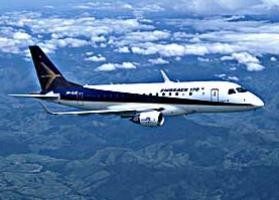It seems like it won’t be long before aircraft flying with biofuels is an everyday occurrence. The latest test flights were conducted by Embraer and GE flying a EMBRAER 170 jet from the Company’s Gavião Peixoto facilities. The purpose of the tests were to benchmark the operational characteristics of the airplane and its GE CF34-8 engines when flying with a HEFA fuel – a biofuel blend comprised of hydro-processed esters and fatty acids.
The 50 percent HEFA biojet fuel blend, derived from camelina, has received recent approval by ASTM. As a result, Embraer said they are stepping up their efforts to develop a broader range of sustainable biofuels for aviation. To date, the tests of the biojet blend have been successful and future tests are planned.
 “We have a strong and longstanding commitment to developing efficient and environmentally responsible products,” said Mauro Kern, Embraer Executive Vice President of Engineering and Technology. “This series of tests, and their very positive results, gives us a lot of new information to continue our sustainability program as it relates to future products. Supporting the development and deployment of sustainable aviation biofuels is one of the industry’s top priorities, and we are firmly engaged in that effort.”
“We have a strong and longstanding commitment to developing efficient and environmentally responsible products,” said Mauro Kern, Embraer Executive Vice President of Engineering and Technology. “This series of tests, and their very positive results, gives us a lot of new information to continue our sustainability program as it relates to future products. Supporting the development and deployment of sustainable aviation biofuels is one of the industry’s top priorities, and we are firmly engaged in that effort.”
Next steps for the two partners include testing other feedstocks and production pathways for production of the biofuels.
“This could encompass a broad range of pursuits, from testing of additional fuel production pathways and feedstocks, to potentially increasing HEFA blend levels,” added Laurent Rouaud, Chief Marketing Office, GE Aviation. “These flights have also demonstrated that the aircraft and engine manufacturers are also interested in limiting net carbon emissions from their ongoing product development activities, and in working with producers to establish early production demand for the benefit of the entire aviation enterprise.”

